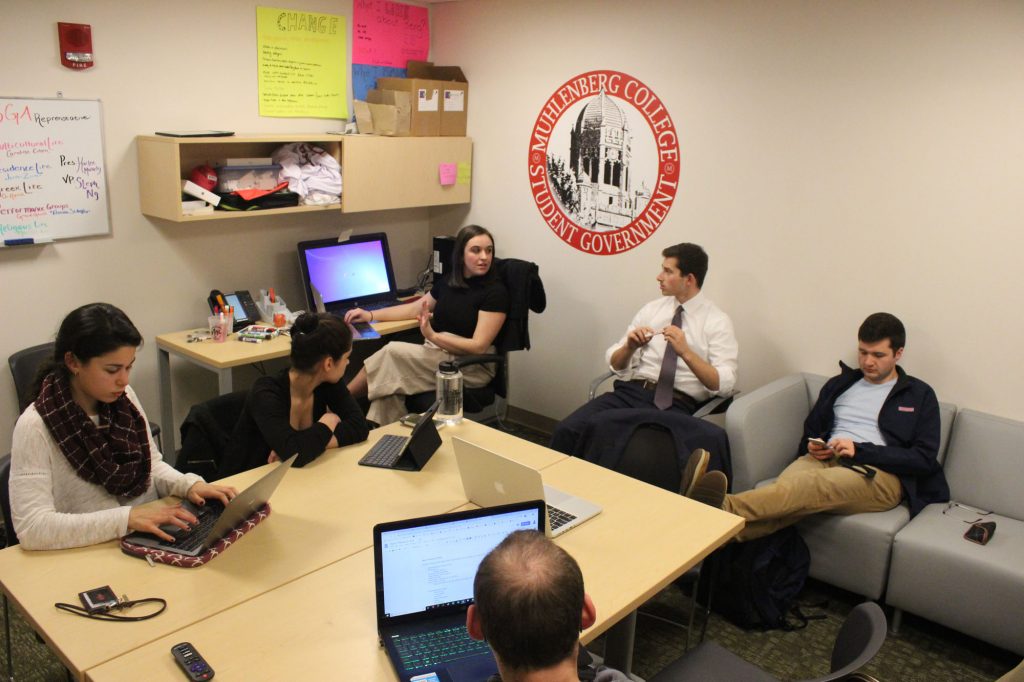On April 15, students will be able to vote for their SGA president and representatives for the 2019-2020 academic term. Along with the 28 students running for representative positions, Jonathan Diaz ‘20, Nicholas Gregg-Rubingh ‘20 and Stephanie Ng ‘20 are vying for the spot of president, set to replace current SGA president, Karlee Makely ’19.
The Muhlenberg Weekly sat down with two of these presidential candidates to hear their goals, plans and hopes for the future of SGA and Muhlenberg, beyond their personal statements available online. Diaz could not be reached for comment.
The Muhlenberg Weekly: What sets you apart from the other two candidates?

Nicholas Gregg-Rubingh’s campaign is hoping to improve transparency between SGA and the student body.
Photo ocurtesy of Nicholas Gregg-Rubingh.
Nicholas Gregg-Rubingh: “I’ve served on SGA for two years now and I think during that time I personally have been able to start a number of initiatives and see them through to their conclusion. So, I think I can really point to a track record of things I’ve accomplished and I think that shows that going forward I’ll continue to be able to do that.”
Stephanie Ng: “Well I think I’m pretty involved on campus. I’m involved in a lot of different things for example, I’m a bio major but I’m also a math and art minor, but I’m also an athlete, so I see all different groups and I can relate and really see what people need and want.”
Ng also cites her organizational skills in helping to facilitate her proactive nature.
“My goal is to also motivate other people and help them build their leadership while I’m building mine.”
TMW: What is one central improvement that you would focus on as president?
NGR: “One of the main reasons I decided to run is because I’ve noticed SGA recently has been heading towards a kind of turning inward and spending a lot of time changing our own bylaws, changing our election dates, reshuffling around our structure and constituent groups and all this,” he explains.
“I think in some ways there’s a lot of untapped potential and we’ve kind of lost sight of our original purpose which is helping students and making students’ lives better. So, I want to run for president because I want to start pushing us more in the direction of going out to the students and finding problems and coming up with solutions with them and stop worrying about ourselves and start worrying about our students.”

Photo courtesy of Stephanie Ng.
SN: “The big thing that I’ve been working on. . .is that I think the reading period at Muhlenberg is way too short. We did bring [this issue] to the Academic Policy Committee. This has been brought up several times and nothing has been done about it.”
Ng recognizes the issues involved with creating longer reading periods, like negotiating contracts with Sodexo for keeping school resources open longer, but she is adamant about the necessity of this extra time.
“That’s something that I definitely want to work on. . . I really think we need an extra day or two for the reading period.”
TMW: What do you think about SGA’s new constituency program? Has it improved transparency and communication with students? How would you continue or not continue the program as president?
NGR: “I think the constituency program itself is a great idea and giving people individual students to talk to is a great idea and [does] a little to improve engagement and transparency as a whole.”
However, after being abroad last semester, Gregg-Rubingh expressed concern that a number of initiatives he had previously worked on to create transparency with students are no longer in effect.

Jonathan Diaz, the third SGA presidential candidate.
“My aim is to provide a voice for those who feel underrepresented on Muhlenbergs campus,” said the multicultural intern in his official campaign statement.
Photo courtesy of Jonathan Diaz’s Facebook page.
“I started sending out a weekly summary of the meetings to everyone in accessible language and that’s no longer being done. Our meetings were moved from [Seegers Union] where anyone can stop by, to the second floor of Haas. . .I think we backslid a little bit on some of the progress we’ve made, and while constituency groups are a great step in the right direction, there’s a lot of other things we need to do.”
Gregg-Rubingh discussed the difference between what he calls “passive transparency” and “active transparency.”
“Passive transparency is ‘oh their data is available’ but you have to really seek it out, walk over to Haas, go on the Web site, and look around for a while before you find it. I think we should have active transparency where we’re not waiting for people to come to us, where they’re letting us know ‘Hey this is what’s going on. This might concern you.’”
SN: “I think it’s definitely a good program, but I think the faults in it are if you have a representative who isn’t willing to go and meet with their constituency groups. I think one thing we’ve been struggling with is the constituency groups aren’t necessarily communicating back with us so we’ll really try to reach out but then we’ll send out emails and no one responds. So just improvement on communication and how to get people more engaged, would make it a more effective program.”
TMW: A lot of students seem to only interact with SGA to get funding for clubs or organizations. How would you maybe improve this process and make the interactions more than just about funding?
NGR: “Another one of the reasons I decided to run is because I feel like a lot of people have started to see SGA as more of an obstacle than a resource, like something you have to get around and make sure you check all their boxes or else you won’t get any funding for the year. I think SGA can be a tremendous resource and working together with people to solve problems and I think constituency groups are a step in the right direction.”
Gregg-Rubingh explained how direct interaction with student groups can create effective change.

“One of the initiatives I personally worked on were gender neutral bathrooms. Muhlenberg Trans Advocacy Coalition, MTAC, made a presentation to student government and they told us that they talked to President Williams about why we need gender neutral bathrooms and he kind of arm waved and said there are too many laws that made it difficult, which didn’t sound right to me. So, I called the Allentown mayor’s office, I called the code office, and I met up with a local Allentown architect. Then I went through over 100 pages of the International Building Code, and then I formed the joint committee between Muhlenberg Trans Advocacy Coalition and student government.”
We have the power to improve students’ lives in a tangible way, and I want to be president so I can start moving us towards that and start helping students’ lives and improving student confidence in student government.
Nicolas Gregg-Rubingh
He describes how the committee counted every toilet and sink on campus to create a presentation for school administration on how creating gender neutral bathrooms was possible, leading to many being designated on campus.
“People don’t know SGA is a body that can [create change like gender neutral bathrooms], can get behind you and work on things. They see us mostly as a funding thing. Sending out a summary of what we’re doing and reaching out to people so they know ‘Hey we actually do stuff’ when we have a hot button issue or an issue of importance to the students will actually inform them and let them know how they can get involved.”
SN: “I don’t think people realize the committees that we sit on sometimes. Right now for example I’m sitting on CCFL, it’s a committee for fitness health on campus and we meet and talk about things such as creating an athletics honor society. There’s an academic policy committee where we have a student representative there. I think just one thing which we’re trying to work on also is outlining all of these committees and making them more accessible to people. . . I think internally as SGA that clears thing up for us but also creates transparency for the students so they know exactly who they’re going to and what’s being done.”
TMW: Do you have any ideas or programs that you would implement to support marginalized students on campus?
NGR: “In terms of marginalized groups on campus, one problem I’ve noticed in the same vein as transparency, is there’s a lack of communication. With the Bear Security incident that happened when they were finally kicked out, when we finally ended our contract with them after the last straw, I ended up talking with a number of students who said ‘Oh I had issues with Bear security and this happened, and I reported it to the administration but I thought it was kind of a one-time thing so I let it go,’ and this was quite common, and because everyone thought ‘oh it’s just a one-time problem’ action wasn’t taken until it spiraled to such an unacceptable level. So, by communicating incidents more adequately to the students they will know ‘Is this a one-time thing or is this a serious issue?’”
SN: “I think creating more opportunities and communities for people [is important]”
Ng discussed some struggles in finding a community to interact with as an Asian student on campus, as well as improving dining options for international students.
“My goal is to also motivate other people and help them build their leadership while I’m building mine.“
Stephanie Ng
“I know that a lot of International students get really frustrated with the dining hall for example, so just giving them more opportunities to go off campus and being able to explore. I know a lot of them will drive off campus and buy their own groceries to cook. So just creating more programs for them to have things more accessible. Right now, I’m sitting on a committee that is going to establish new fraternities and sororities and Greek life on campus, and one of the things we’re talking about is making sure that we have a fraternity or sorority for multicultural life and minorities. So, I’m definitely an advocate for that, and I understand where those people are coming from.”
TMW: Would you like to see more student engagement with SGA and how could you improve engagement?
NGR: “We currently have three committees on SGA, Student Engagement, another one which is basically a synonym for student engagement, and Finance Committee, so possibly even the creation of a fourth committee [whose] whole purpose is to seek out and identify those issues whether it be gender neutral bathrooms. . .to replacing the charging cords when they got old and frayed. . .Identifying these little issues on campus that aren’t hard to fix and then using our power in the administrations here and our funding to fix them. A committee [that is] actually seeking out, canvassing, asking people ‘hey what’s a little problem?’ and then coming up with solution to that. Another big one I’m working on now is laundry, and how there’s only one change machine on campus and it’s in the far corner [of campus].”
SN: “Yeah definitely, but I understand [that some] people don’t want to get involved because they’re so involved with other things as well, but what I think is important for people to understand is also that if they’re not going to interact and engage [with SGA, then] you’re not going to see the change that you want to happen. We are the liaison between the administration and student, so if we’re not utilized, we have a bad image. People don’t like us and have this false image of us, but we really want them to utilize us.”
TMW: Why do you want to be SGA president?
NGR: “I think SGA is doing fine, but I think we have a whole lot of untapped potential and we don’t have to just be an obstacle or money granting organization for the students. We have the power to improve students’ lives in a tangible way, and I want to be president so I can start moving us towards that and start helping students’ lives and improving student confidence in student government. “
SN: “I just hope to help people. . . For me it’s an opportunity to ensure that I’m able to help people and really listen and develop my leadership skills as well as helping others, and I really hope that I can foster a better community in that way.”
Laura is a sophomore Media and Communication student in the Pre Law program. In addition to being News Editor at the Weekly, she is a DJ at Muhlenberg's radio station WMUH.





















